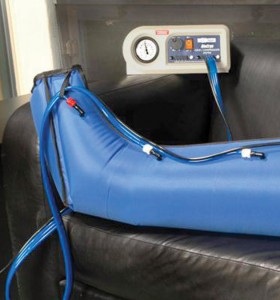By Alyssa Parker –


How the Lymphatic System Works
What does edema have to do with your lymphatic system? The lymphatic system serves as one of the body’s main highways. Through its network of vessels and ducts, it works as a filtration system for body fluid entering into the blood stream. This fluid is referred to as “lymph” fluid, which is the interstitial fluid consisting of proteins, wastes, and a collection of white blood cells. The kidneys, skin, lungs, or intestines then eliminate the wastes that have been filtered out of the lymphatic vessels.
What is Lymphedema?
Lymphedema is a degenerative condition which means it will only get worse over time without treatment. There is no cure for Lymphedema. Once a lymph node has been damaged, your lymphatic can become compromised. Over the years, as you get older, you may incur irreversible damage to the lymphatic system through medical procedures, injuries, or infection. Examples include cancer radiation, surgical lymph node removal, joint replacements, scarring of the lymphatic vessels through reoccurring infections i.e. cellulitus, or other health problems relating to gall bladder, kidneys, intestines, or reproductive organs. When an obstruction has occurred, a blockage in the lymph nodes can occur. The limb begins to swell with fluid because the lymphatic system is blocked/impaired, unable to move the fluid back into the circulatory system.
Compression Pump Treatment
One recognized treatment is using a compression pump. This is a safe and effective way to assist your body’s lymphatic system in moving the lymph fluid which has accumulated in the limb and can cause painful swelling, non-healing wounds, heaviness, and discomfort decreasing your mobility. The compression pump is a gentle massaging technique that compresses in a rythmatic cycle, similar to that of a normally functioning lymphatic system that has not been damaged.
Possible Symptoms of Lymphedema
- Swelling in your legs or arms
- A feeling of heaviness or tightness
- A restricted range of motion
- Aching or discomfort
- Recurring infection/cellulitis
- Hardening or thickening of the skin on your arms or legs
It is important to rule out other causes of edema including nutritional issues, allergies and reactions to medication you may be on. True Lymphedema should not be treated with Diuretics as they draw from the Venus system not the Lymphatic system. Removing fluid from the body in this fashion takes away the wastes’ only means of transport and can lead to serious recurrent infections or cellulitis since the lymph waste is now trapped in the limb and has no place to go. If symptoms return when you cease Diuretics, you should be asking questions and seeing a specialist immediately. This is where choosing a physician experienced in recognizing and treating Lymphedema is critical.
Some Good Questions to Ask Your
Physician Include:
- Does my family have a history of swelling (Hereditary Lymphedema)?
- Stemmer’s sign present?
- Pitting (push your finger into your skin and count how long it takes to return) or skin hardening?
- Hemosiderin staining (port wine skin stains or “red socks”) appear from the ankles down?
- Traumatic injury or surgery potentially damaging Lymph nodes (Hip replacements, etc)?
- Radiation to Lymph areas?
Specialists in Acute Wound Care
Remember, ANY swelling is an indication of an overloaded Lymphatic system. Acute Wound Care, LLC is a highly focused local provider of wound products and compression pumps working with select area physicians highly versed in this condition. For more information and articles on this topic, Google “Acute Wound Care,” visit www.AcuteWoundCare.com, or call 239-949-4412 and speak with a specialist. Remember, nothing heals faster than an educated patient.
 Southwest Florida's Health and Wellness Magazine Health and Wellness Articles
Southwest Florida's Health and Wellness Magazine Health and Wellness Articles

